Silent Wings 4 and 4 Pro review. Be quiet! reinvents classic fans. Now like the “transformers”. 2 Mounting options, and Switch!
It is difficult to innovate in a field where the classic construction standard applies for several years, it is difficult to reinvent a well-established product and in some ways quite “standard” and simple. The fans are one of these products, specific apart in fact, their structure has never changed particularly over time.
The difficult move of be quiet! with the new range of products it was this, reinvent the classic PC fans, without upsetting the structure of the well-known Silent Wingsbut introducing small big changes that make the classic fans we are used to, now, smarter!
Let’s get to the heart of the review without wasting any more time, and find out all about the new range of Top Range Fans.
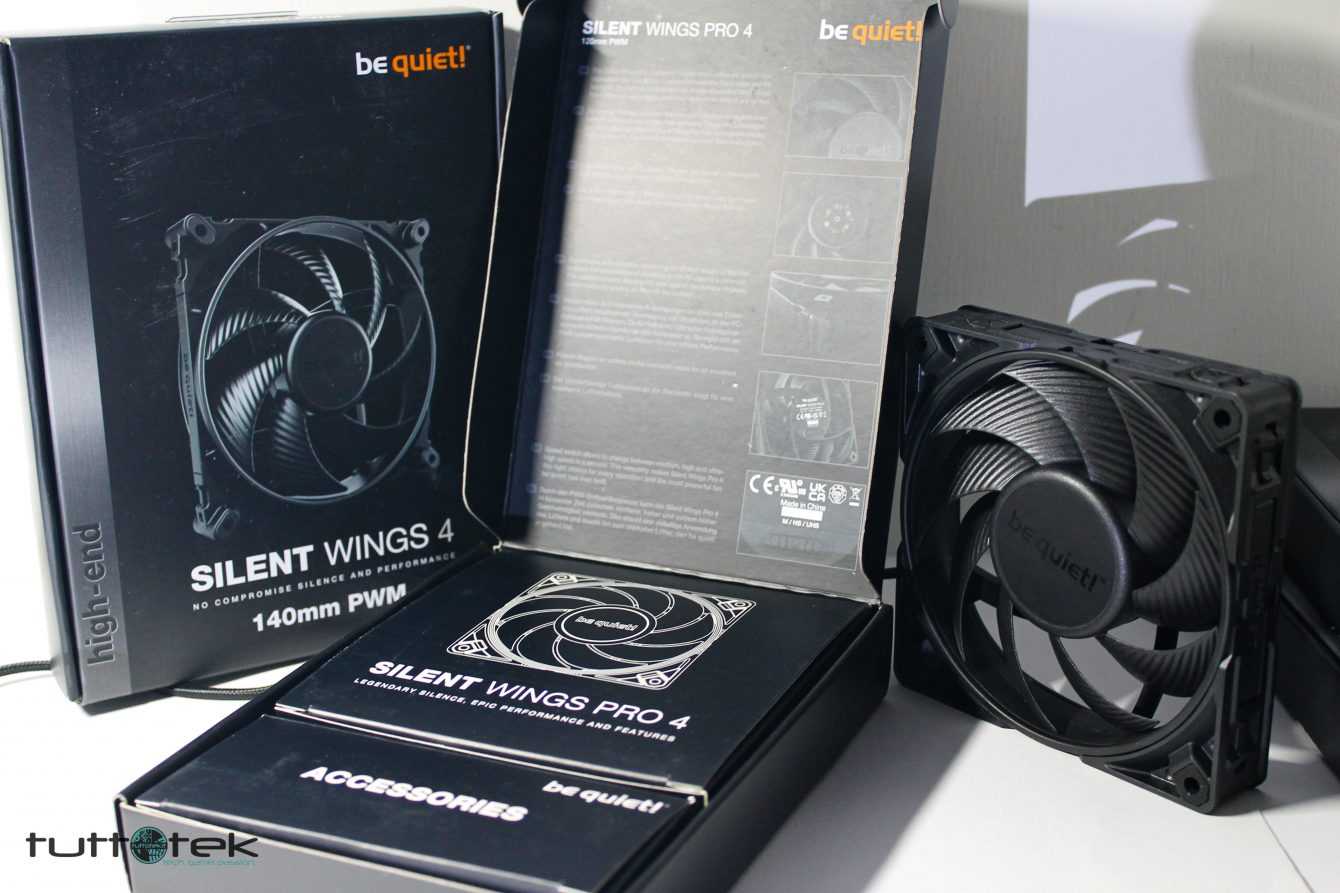
4 are the families of fans of the German house be quiet !, we find the Pure Wings 2 and variants RGB Light Wingswhich with modest specifications make versatility their primary weapon, then moving up the range Shadow Wings 2 always committed to achieving the best silence / performance ratio, and finally the top range, that is the family Silent Wingswhich aims at maximum performance without compromise, if not that of operating silence.
The new Silent Wings 4 and 4 Pro, are unique on the market, because they differ from the past both in terms of specifications, both in terms of internal structure. Especially the 4 Pro variant, we will soon find out why.
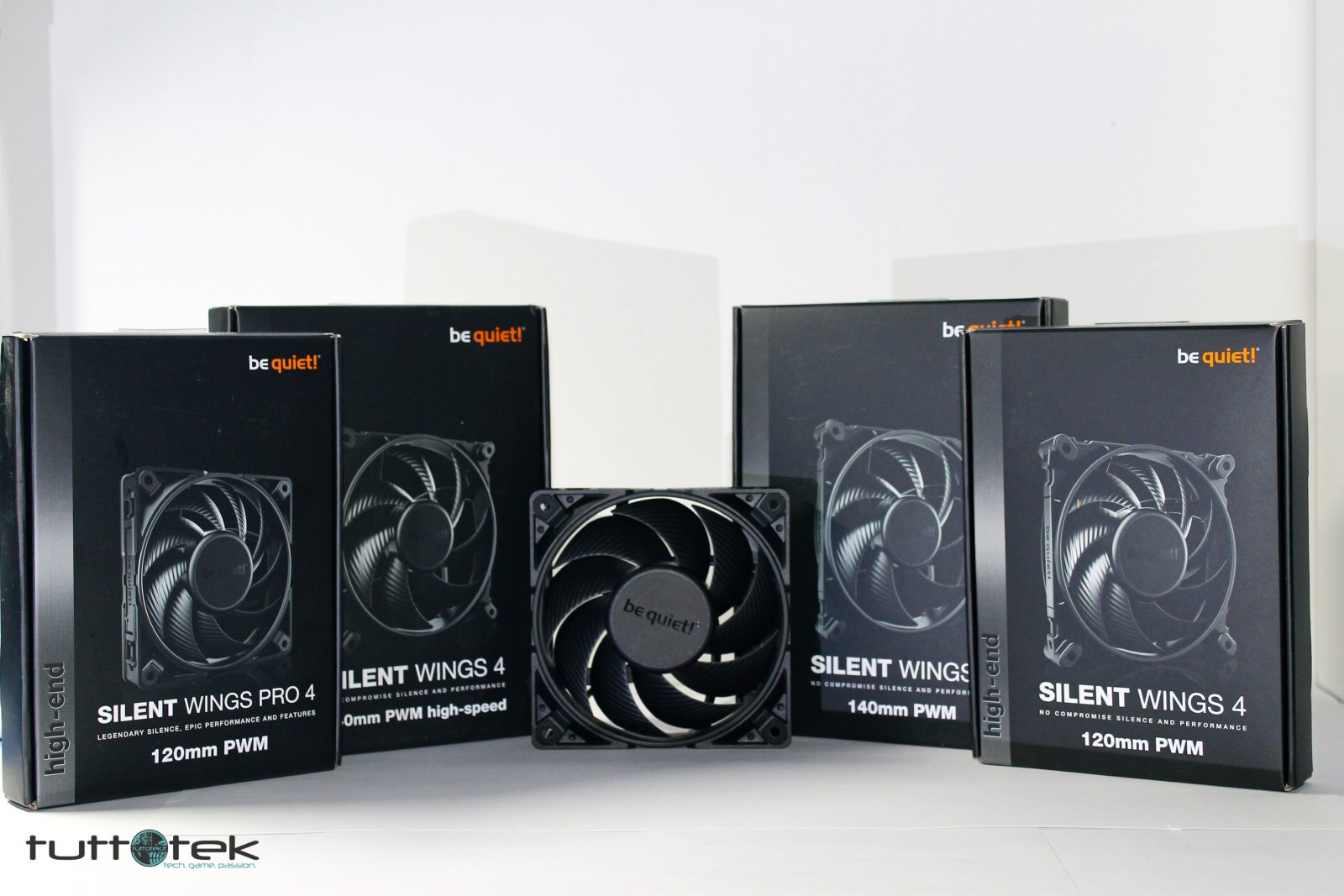
A general look | Review be quiet! Silent Wings 4 and 4 Pro
The new fans rely on a powerful new one 6-pole motorbut always based on technology fluid-dynamic bearingcapable of operating with a lower power if necessary and less vibrations emitted. The new engine has been designed to adapt to both static pressure (air pressure) such as the use with radiators where there is a need for constant pressure and high flow rate, both for pure airflow works, therefore as classic fans to ensure air recirculation in our houses, where a lot of high-speed air volume is required. A more efficient and versatile engine. We continue the review of be quiet! Silent Wings 4 entering the heart of the structure.
The innovations do not stop on the engine, in fact the structure of the blades has also been revised. Now there is a new arrangement of the same, with a smaller distance from the external edge of the fan, a process that required production as accurate as possible, but which allowed to increase the air pressure emitted, and therefore also the reaching higher RPMs, keeping the noise generated during operation within acceptable levels.
We continue the review of these be quiet! Silent Wings 4 and 4 Pro talking about the new blade structure, which allows these fans to be very versatile, being able to produce decidedly interesting performances both in use with radiators, and to achieve a correct air flow inside our Houses. . The optimized blades now literally touch the edges of the fan, in fact the gap is only 1mm. And they are designed with a pattern that conveys the hot air towards the ends of the same, keeping the medial part of the blades cold, so as to optimize the channeling.
They are made of PBT, and are very sturdy, to the touch they return an excellent sensation, the release system is also robust. Also thanks to the reinforcement with 30% of glass fiber. This material makes them robust but resistant to vibrations and able to absorb them. The Fluid-dynamic bearing technology then allows this engine to boast a “life span” of about 300,000h.
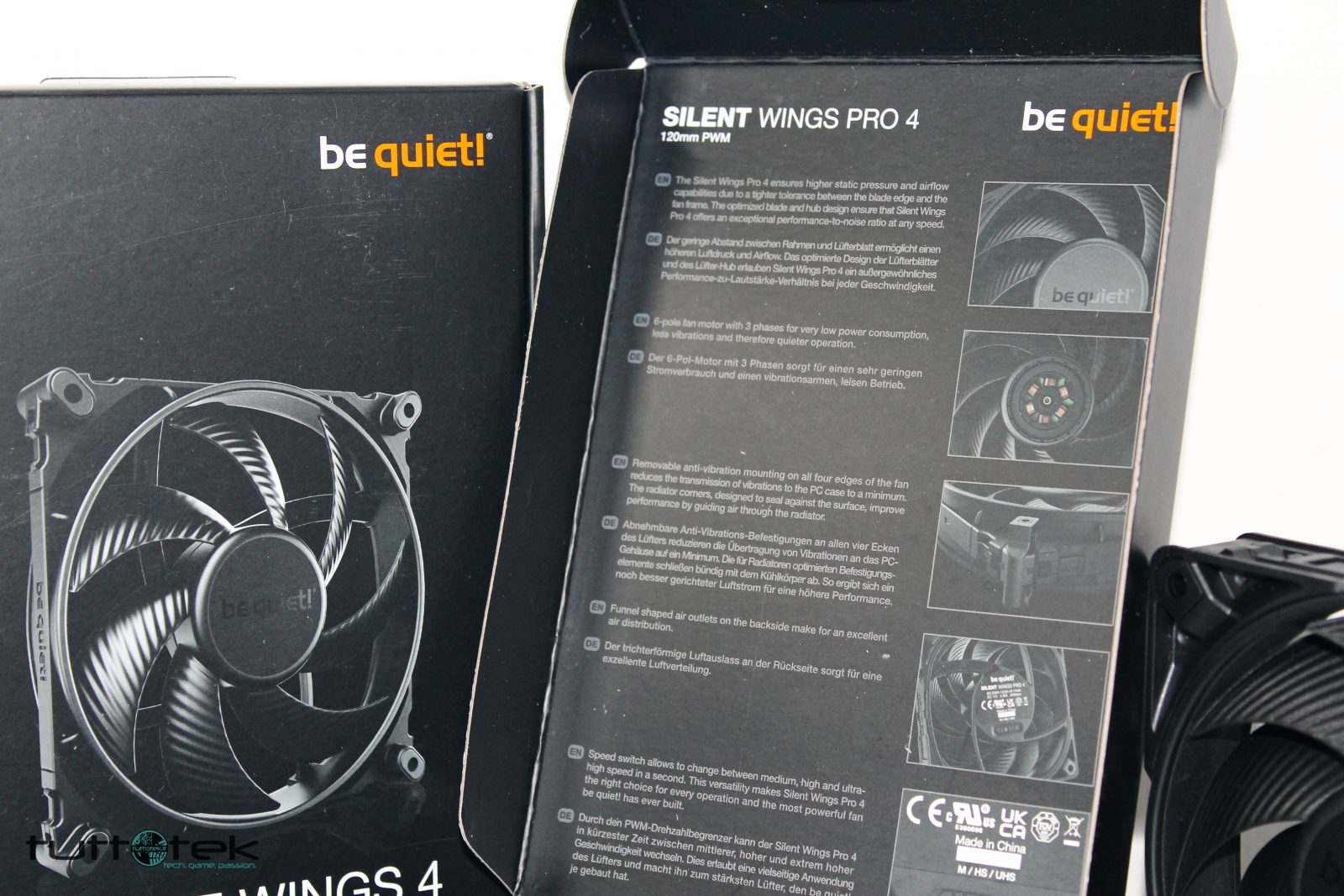
Focus on Silent Wings 4 Pro: it is capable of transforming and has a physical RPM selector
The main protagonist of this series is obviously the Silent Wings 4 Pro modelbut let’s go step by step.
Both model 4 and model 4 Pro can change their structure to adapt to any context. be quiet! has created a structure that allows the quick release of the 4 corners of the fan, so that they can be changed with other 4 corners that the brand includes in the package. There are 2 mounting kits for each single fan, a kit suitable for Case applications, therefore for Fan Airflow purposes, as they are optimized on two fronts; the first is that it allows a faster mounting to the case, both through quick coupling / release pins and with classic screws, the second is that it creates that perfect millimeter distance between the fan and the case to optimize the air flow. This as regards the first kit, the secondary assembly kit instead, is optimized for static pressure, therefore for use with radiators, as it allows an optimal approach of the same to the lamellar body, improving final performance.
Unhooking the 4 corners is an easy and intuitive operation, and takes less than a second, there are 2 clips, just press them, and the corner pops out by itself, for the installation of the other corner, just let it shoot by placing it in place. And in less than a minute your fan will be suitable for any context that presents itself to it. In addition, the wording “Corner Type A” is indicated to indicate the factory one which is supplied by default, in case you forget.
Before continuing with the review of these be quiet! Silent Wings 4 and 4 Pro, a hint on the assembly, the latter very convenient, given its system, which can be done either with 4 pins of absorbent anti-vibration rubber and 4 attached rubber washers, or with the classic 4 screws.
A clinical eye for extreme detail | Review be quiet! Silent Wings 4 and 4 Pro
be quiet! searched this product for maximum attention to detail, introducing a further absolute novelty in this field. We all know how difficult it is in different contexts to grasp the end of the cable to connect the fans, in some contexts the grip is zero and the smooth and squared structure of the pins is difficult. be quiet! not only has he created well-kept Sleeved cables, definitely more beautiful to look at, but also a new proprietary connector, now longer so as to be better handled, and decidedly more rigid, for a better fit. Small details, which on the whole, when needed, will make the difference. Really handy when you have to connect the fans in tight and difficult places due to the Case or other components present.
Incredible novelty in the sector, unique and rare, the introduction of the physical selector to adjust the RPM range, thanks to integrated PWM profiles.
It is placed behind the fan, that part recognizable by the classic adhesive that includes the specifications, usually the part where the air is emitted. Some might think that this may not be comfortable or accessible, this is true but only partially. First of all this particular function classifies them directly as the best candidate for the practice of extreme overclocking, a godsend to save resources (not using management software that takes up a lot of RAM) to physically select the speed of the same, based on the context. And above all in all those situations in which they are installed on Test Benches, where accessibility is direct. In a classic context, on the other hand, perhaps if installed on a PC, you can obviously change the speed via software management from Windows, but having a function like this can be useful if you should adjust the speed in the BIOS, or if the program does not work by way of of bugs, or you simply cannot access the software, perhaps during an update, or during long queued renderings that do not allow you to open other applications.
In short, is it a killer feature that makes you lean towards this rather than anything else? If you are an overclocker practicing LN2 or using for work or pleasure TestBench are absolutely a Must, for other fields not, but it is something that having it, as well as being something more can be useful in the contexts mentioned. Only note, only if we are talking about mounting inside a PC, access to the selector depends on the position in which it is installed, and this depends on whether in Push or Pull configuration according to your choice, in case it is placed in Push for example and it is screwed, access will not be possible, but only if fixed with screws, the rubber pins for quick coupling allow you to detach the fan in a second.
The speeds that the switch allows you to set are one with low latency, an average, and one at the maximum possible speed, that is 3000 RPM.
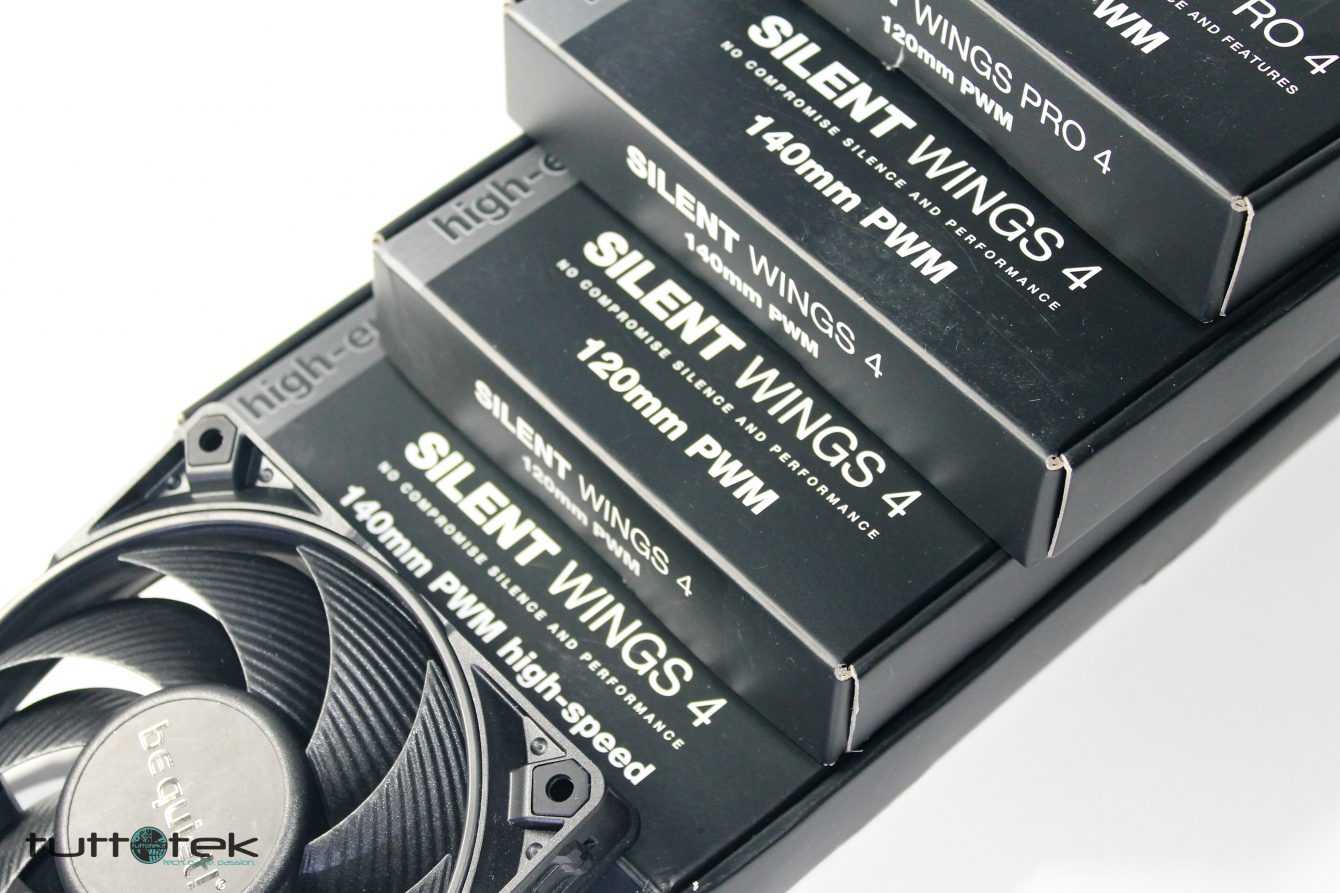
Specifications and tests | Review be quiet! Silent Wings 4 and 4 Pro
We now give you the specifications, so that you can get an idea of that model for you or any comparisons.
- Silent Wings 4 da 120mm; range RPM 1600/2500
- Silent Wings 4 da 140mm; range RPM 1100/1900
- Silent Wings 4 Pro da 120mm; range RPM 1600/2500/3000
- Silent Wings 4 Pro da 140mm; range RPM 1100/1900/2400
In use, the assembly was very comfortable and as mentioned extensively in the text, the small goodies inserted make these fans not only extremely comfortable, but also very versatile. I had a lot of fun getting my hands on the fans by experimenting with different locations and fixings. The selector can also be operated with the fans moving obviously, without causing damage to them.
We tested the fans in our reference test bench, with really good results. Compared to the Noctua 3000 Industrial by 14 the difference in different scenarios was about 1/2 degrees, in each scenario, in favor of the Silent Wings. They seem few, and perhaps in absolute terms they are, but in reality this is not the case. As it is really difficult to optimize a product, in terms of performance, not a now standard design, and only 2 degrees in the total can make the difference. In terms of noise the difference is more noticeable, inaudible in conditions of average use, and not annoying when a maximum load is required. Close to, or, at 3000 RPM, they are obviously audible, but not significantly. Remember that be quiet! claims for their more “noisy” model 36.8 db (A), we actually detected even less, or 32 db (A) at full load.
To carry out the test, we considered a be quiet! 360mm Silent Loop 2installed on a AMD Ryzen 7 3800X, we carried out 2 tests. One leaving the PC in question in complete Idle, and for 30 minutes we monitored the summary temperatures (not of the individual Cores) of the CPU with a software, the entire Package to be clear. The second test instead saw 10 Cinebench R23 Runs to be exact, launched at a distance of 1 minute from each other. The difference, as repeated above, was always in the range of 1/2 degrees in favor of the Silent Wings.
Conclusions and Prices
At the end of this review of the new be quiet! Silent Wings 4 and 4 Pro, we come to the prices;
- Silent Wings 4 da 120mm; 23,90 Euro
- Silent Wings 4 da 140mm; 24,90 Euro
- Silent Wings 4 Pro da 120mm; 31,90 Euro
- Silent Wings…













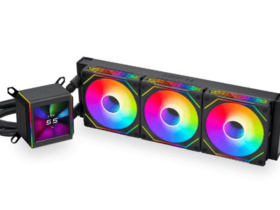


Leave a Reply
View Comments